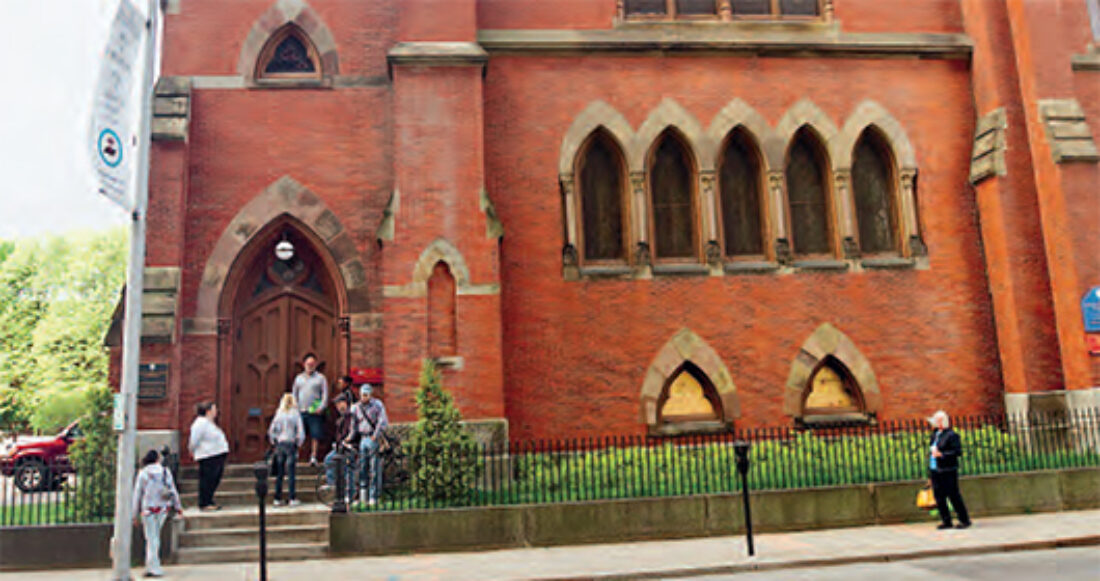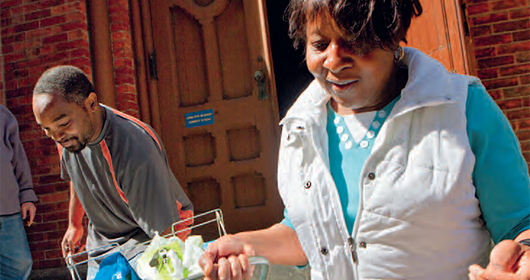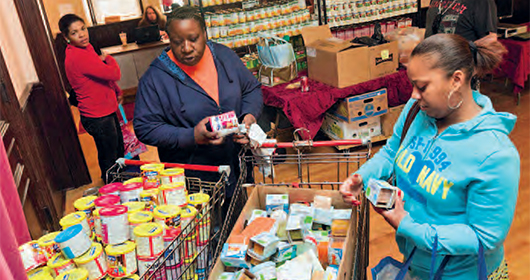Faith in Communities

Debbie Nealy of Providence, Rhode Island, had to give up her job as a receptionist after bone fusion surgery a year ago for degenerative disk disease, and her doctor still hasn’t okayed a return to work. She’s back on her feet, but feeding her sons, ages 7 and 9, would have been tough if not for the Providence In-town Churches Association Food Pantry. Food stamp recipients are allowed one visit a month to stock up at the free pantry, which has expanded its facilities and gone from serving 700 to more than 5,000 people a month—testament to the state’s battered economy—in just two years.
“It has truly helped my family,” says Nealy. “With the prices of food today, it is hard to get the things you like. They have the better brands, the more natural stuff here, an abundance of fresh vegetables,” she says. “My boys are like bottomless pits, but they are eating healthy.”
How the Providence In-town Churches Association increased its ability to provide services like the food pantry offers a glimpse into the way modest funding and technical assistance from the Casey Foundation, in partnership with other funders, has helped faith-based organizations improve and expand how they serve community members in need.
Casey sought to cultivate the faith community in launching its Making Connections initiative in the late 1990s. This initiative aimed to demonstrate how residents, civic groups, and the public and private sectors could mobilize around an agenda to improve the odds for children by strengthening their families and neighborhoods. “Our aspiration was to improve outcomes for vulnerable children and families by harnessing the unique strengths of the faith community,” notes Carole Thompson, a Casey Foundation senior associate.
Targeting small and mid-sized congregations where faith leaders often have a strong commitment to serve but lack formal training and networks to help tackle complex social problems, Making Connections launched an intensive effort to identify the local faith community’s strengths and challenges.

Over the past decade, the Foundation’s Faith and Families portfolio has served as a catalyst to bolster faith-based organizations’ ability to serve in many ways, from providing training and educational opportunities to producing how-to reports on best practices. Casey has also co-sponsored local convenings to bring clergy together as well as highly visible national conferences that drew Making Connections and faith leaders from around the country. These gatherings provided a forum to foster discussion and offer guidance on how faith communities could most effectively help strengthen families and communities.
Casey also supported development of a model effort to help faith-based organizations provide assistance to formerly incarcerated individuals as well as the families of ex-prisoners.
When President George W. Bush established the White House Office of Faith-Based and Community Initiatives in 2001, “It was timely in that we had started the exploration to find out how faith affects neighborhood transformation and family development,” says Thompson. In 2002, the Administration for Children and Families launched the Compassion Capital Fund, which aimed to help faith-based and community organizations increase their effectiveness, enhance their ability to provide social services, expand their organizations, diversify their funding sources, and create collaborations to better serve those in need.
Providence, a Making Connections site, was particularly successful in garnering those grants. “Casey was letting all the Making Connections sites know there was an opportunity to make use of those funds and provided technical assistance and financial support to help us apply,” notes Patrick McGuigan, executive director of The Providence Plan, a nonprofit that works to improve economic and social well-being.
McGuigan says the support Casey provided helped The Providence Plan overcome some issues that kept others from taking advantage of this important chance to strengthen faith-based organizations.
“People were afraid of going after the money and facing too many restrictions and bells and whistles that wouldn’t honor the church-state dynamic,” notes McGuigan. “But we looked at the regs really carefully and we said no, this is a good opportunity as long as we make the rules of engagement clear.”
Establishing detailed guidelines on how the funding could and couldn’t be used, The Providence Plan set up a program in 2005 called New Roots Providence, specifically dedicated to helping community and faith-based groups get stronger and expand their services.
The Providence In-town Churches Association, a coalition of churches that has been serving the poor and homeless since 1974, was one of the first to apply for New Roots funding. It received a three-year grant that helped it restructure its board with much more community representation; develop a defined mission, strategic plan, and fundraising strategy; hire a larger and more experienced staff; and offer comprehensive case management.
This support “really increased the capacity of the agency and consequently our capacity to serve clients,” notes Diana Burdett, who took over in 2003 as executive director. The knowledge she’s gained from attending monthly training sessions New Roots offers also has equipped her to apply for additional funding—such as a $25,000 Champlin Foundations grant that helped relocate and expand the food pantry.

This past May, New Roots awarded 27 grants, bringing to 108 the number of organizations in Rhode Island that have received support to strengthen management structures, develop new funding sources, and create partnerships to better serve their communities. New Roots has garnered $4.5 million from the Compassion Capital Fund as well as the Obama administration’s Strengthening Communities Fund, matched by $800,000 in private foundation and state funds, for a total program expenditure of $5 million.
Nzinga Misgana, a consultant and former New Roots director, notes that Casey support, which totaled $381,000, helped draw “a lot of co-investment and millions in federal funding” to New Roots Providence, which in turn helped faith-based and community organizations serve more people more comprehensively.
“By supporting organizations, you are changing the lives of lots of people at once; it’s a ripple effect,” she says. “We created a community of learners by offering trainings and bringing people from different organizations together.”
Besides reaping the benefits of these training sessions, Burdett of the Providence In-town Churches Association also received guidance from coaches that “I could run ideas past and get turned in the right direction or get some validation.” She adds: “Initially, I was doing so much of this work myself. And that is the loneliest job in the world.”






